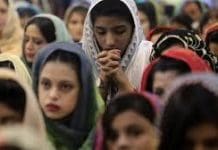By BosNewsLife Asia Service with reporting by BosNewsLife’s Stefan J. Bos
ISLAMABAD, PAKISTAN (BosNewsLife)– Dozens of Pakistani Christians accused of killing two Muslim youths after a terror attack on two Youhanabad churches have been released after years of imprisonment, BosNewsLife learned. Maintaining their innocence, they reached an agreement to pay victim families in exchange for acquittal, Christians said. Under the settlement, the Muslim families reportedly received 30 million rupees ($193,500).
Last week, the anti-terrorism court acquitted all 39 Christians and one Muslim accused of the murders. The killings happened after Taliban group suicide bombers attacked two churches in March 2015 in the Youhanabad area of Lahore city, killing more than a
dozen worshippers and two police officers. Some 70 others were injured in the twin blasts. The bombings underscored broader concerns about anti-Christian violence in the Muslim-majority nation.
Following the attacks enraged, Christians took to the streets in protest, and the mob lynched two Muslim men accused of being involved, witnesses said. On Wednesday, January 29, the anti-terrorism court declared them innocent and ordered the release of all suspects after the reported financial settlement.
The acquittal came too late for Christians Indrias Masih and Usman Shaukat who died in prison due to abuse and poor living conditions, said the Centre for Legal Aid, Assistance and Settlement (CLAAS). The CLAAS advocacy group was closely involved in defending the suspects. “Although we were hoping for their acquittal much earlier, because of the Pakistani justice system, it took much longer than we expected,” confirmed Nasir Saeed, a CLAAS director. “It is very sad that two members died in prison while the trial was going on.”
Saeed said the release was coordinated with churches, political leaders, and non-governmental organizations. “This is a moment of joy for everyone who has been involved in any way.”
DARK DAY
He said the Christians have now been reunited with their families after nearly five years. However, the rights leader cautioned that “the attack on the two churches will always be remembered as a dark day in Pakistan’s history.”
Saeed told BosNewsLife that “those who gave their lives to protect the churches and lives of their fellow brothers and sisters will always be remembered as martyrs.”
A targeted church has their photographs on the outside wall, he stressed.
Rights activists complain that despite several attacks and continued threats, the Pakistani government “has failed” to provide enough security and ensure protection to Christians during worship. Many churches have made their security arrangements, CLAAS noted.
The Christian minority, among Pakistan’s poorest, has faced an increasingly intolerant atmosphere in this Muslim-majority nation, church observers say. As an example, advocacy group Open Doors cited the case of a landlord who reportedly killed a Christian worker in May 2019 “because he dared to work for another employer.”
LOW STATUS
The case, it said, “illustrates the low social status of most Christians and is just a glimpse of the many similar cases that often go unreported.”
Islamic radical religious and sectarian groups have become more prominent in recent years. Pakistan’s Prime Minister Imran Khan claims his government is making every effort possible to meet the challenges that minority communities face.
But analysts say he has vacillated between criticizing religious parties for using religion to enhance their influence and bowing to their demands, including firing minorities from government-appointed positions.
There are about four million Christians in Pakistan, a predominantly Sunni Muslim country of roughly 208 million people, according to several estimates. The Christians are the second-largest minority, after Hindus, and are reportedly almost evenly divided between Catholic and Protestant denominations.
Pakistan ranks number 5 on the World Watch List (WWL) of 50 nations, where it is reportedly most difficult to be a Christian. The WWL is presented annually by Open Doors. “Although there have been no major bombing attacks against church buildings in the 2020 World Watch List reporting period, dozens of smaller “everyday attacks” against churches and cemeteries occur,” the group said.









